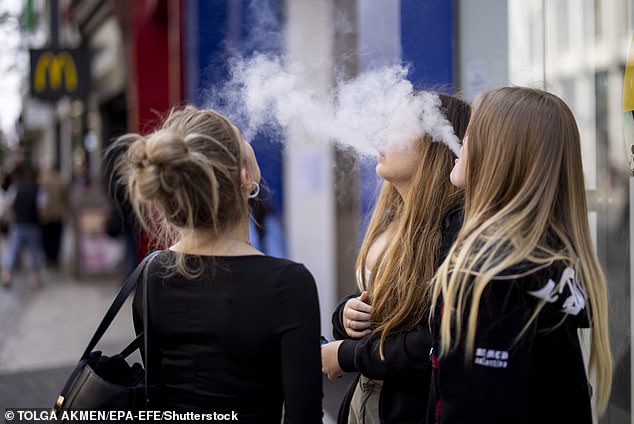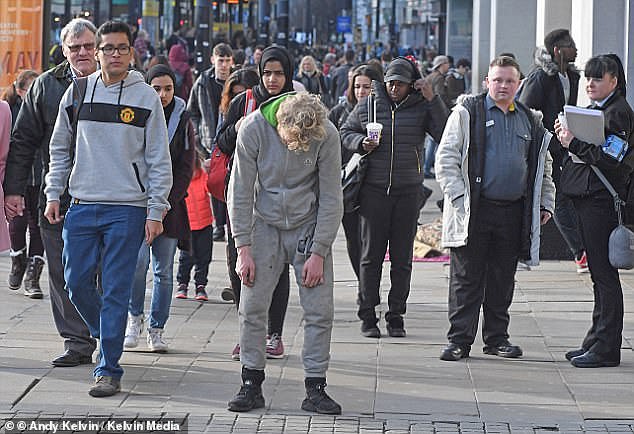One in six vapes seized from children at school contains illegal ‘zombie drug’ Spice, research finds





A shocking new study has revealed that one in six e-cigarettes seized from schoolchildren in England contain the ‘zombie drug’ Spice.
Tests on hundreds of seized e-cigarettes from 38 schools found alarming levels of synthetic drugs being sold on the streets, which can cause heart attacks and strokes.
Police, schools and researchers suspect the substance is being used in vapes marketed as containing cannabis oil.
Professor Chris Pudney from the University of Bath conducted tests of the world’s first wearable device that instantly detects synthetic drugs.
Working with relevant schools and police forces, he tested 596 seized vapes and discovered spice in 28 of the 38 (74 percent) schools in London, the West Midlands, Greater Manchester and South Yorkshire.

One in six vapes seized from children contained Spice, prompting warnings they could cause deaths in schools. Pictured: Stock photo of young people vaping

Spice is a synthetic cannabinoid that can cause a range of serious side effects, including cardiac arrest
About one in six (16.6 percent) of vapes contained Spice, while about one in a hundred (1.17 percent) contained THC, the psychoactive component of cannabis.
With the summer holidays approaching, Professor Pudney is urging parents and carers to discuss the serious health risks of illegal e-cigarettes with their children.
He said: ‘Teens think they are buying vapes or vape liquid that contain THC or nicotine, when in fact it contains Spice.
‘We know that children can go into cardiac arrest from smoking Spice, and I believe some have nearly died.
‘Principals tell me that students collapse in the hallways and end up in intensive care for long periods of time.
‘This is not just a one-off incident happening at a school far away; this is something very ordinary.
‘When the school holidays come around, we can have an open dialogue and talk to children about the risks they are running. Then they have the chance to make a different choice.’
Ben Davis, headmaster of St Ambrose Barlow High School in Salford, invited Professor Pudney to test a batch of seized e-cigarettes at the school in July.

Vaping is highly addictive and potentially harmful, but when mixed with Spice they can be extremely dangerous, experts warn

Spice has been called the ‘zombie drug’ because it leaves users in a staggering, semi-comatose state. (Pictured: A Spice user in Manchester)
He said: ‘We’ve had specific cases of young people under the influence of spice. I remember one young man describing how his hands felt like cartoon hands. He couldn’t control them and they felt like they weren’t his.
‘We also saw two children collapse.
‘Dealing with the aftermath of an accident is a challenge, especially when you have to explain to the child’s family that something potentially life-threatening happened while the child was in our care.
“It is as distressing for their friends who witnessed the collapse as it is for the staff involved: their worst fears have been realised.”
He added that a child who falls asleep in an unattended area, such as a toilet, may not be discovered until it is too late.
“We’ve been lucky so far, but I think it’s only a matter of time before there are serious injuries or deaths,” he said.
“My message to families is, don’t assume your child isn’t involved. There’s a good chance they are, or they know someone who is. Please talk to them about it.
“Be open, nonjudgmental, and accepting. As soon as you judge or blame, barriers will be created and you will not reach your child. This conversation is crucial for their safety.”
To address this problem, Professor Pudney has donated a portable Spice detector to Devon and Cornwall Police.
Chief Inspector Sarah Johns said the device will help them determine the scale of the problem and deploy resources most effectively.
“Our clear message to all young people is that the risks associated with unregulated e-cigarettes are not worth it,” she said.
‘Young people who are given or offered these fluids will never know for sure what is in them. And as Dr Pudney’s work indicates, it can actually cause serious harm if it is spicy.’
‘There is also criminality and exploitation in the production and distribution of vapes or liquids containing spice or THC. We will seize these whenever and wherever we become aware of their presence.’
Professor Pudney has also tested e-cigarettes in four schools in Greater Manchester, under the supervision of Greater Manchester Police.
Detective Constable Laura Bell, from GMP’s Organised Crime Unit in Salford, stressed the importance of proactive measures to protect young people.
She said: ‘It is important that we take a proactive approach to keeping young people safe; we know that one of the most effective ways to do this is through education. It is vital that we work with the young people and schools in our communities to do this.
‘Students are educated about the risks of drug use and illegal vapes, the potential consequences for their health and the wider long-term implications for their future.
‘We encourage parents and caregivers to discourage their children from participating in illegal activities and to continue to remind them of the negative consequences of drug use.
‘Unscrupulous e-cigarette sellers have no place in Greater Manchester and unregulated e-cigarettes are often deliberately sold to young people, damaging their health.
‘GMP, together with our partners, is committed to keeping illegal vapes off our streets. We will continue to take proactive action to tackle illegal vaping products and ensure these potentially harmful products are inaccessible to young people.
‘Our operational work has resulted in us seizing numerous vapes, through a combination of store visits, raids and search warrants at all locations where we received information.’
Experts say Spice vapes have created a nationwide problem, with students in schools across the country becoming seriously ill.
Five children were rushed to hospital in January and one child fell into a coma after smoking them.
The incident involved five teenagerswere arrested in Eltham, south east London, aged between 14 and 16, after they all used a rechargeable vape containing blue liquid in a cartridge labelled ‘Vaporesso’.
Professor Chris Pudney called on the government to prioritise this issue at a national level.
He said: ‘At the moment this issue is being addressed regionally, but I urge the government to make it a national priority for harm reduction.
‘I call on the Ministry of the Interior and the Ministry of Education to raise awareness of this issue and provide comprehensive harm reduction guidance and support to police forces and schools.’




